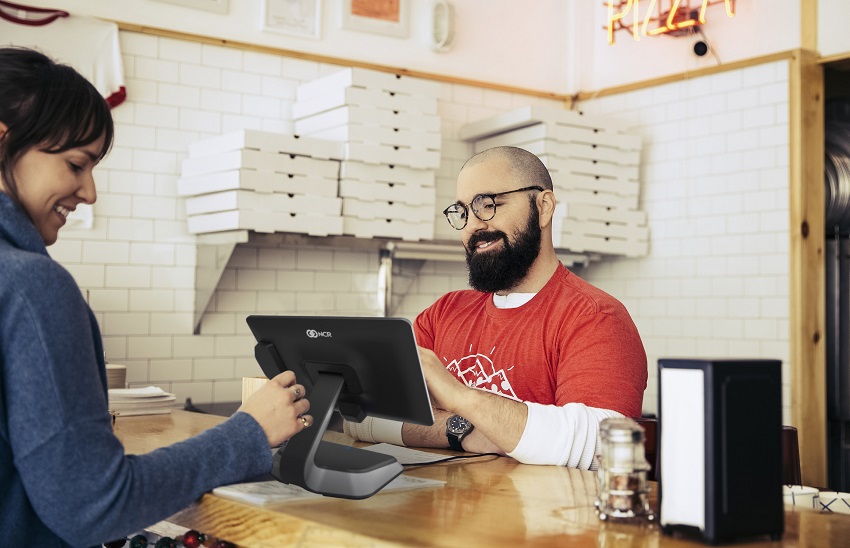AN INTERVIEW WITH
Patrick Lee
Executive Director of Infrastructure Operations | NAMER | Atlanta, GA, USA
AN INTERVIEW WITH
Patrick Lee
Executive Director of Infrastructure Operations | NAMER | Atlanta, GA, USA
Tell us a little about your career journey. Where are you from? What is your role at NCR?
I was born and raised in Dayton, OH and that was the home of NCR until we moved to Georgia 13 years ago. Growing up, I was always exposed to the big companies in the Dayton area like General Motors, Wright-Patterson Air Force Base and NCR. Quite honestly, I always knew that NCR was the place I wanted to work because John Patterson, the founder of the company, really prioritized employee satisfaction. He always had a variety of things for employees to do outside of work, whether it be swimming, picnicking, canoeing, playing softball, volleyball, bowling or golf — there were all types of intramural sports that you could play when you weren't working. I thought it would be a great place to work, but I always knew it was a very family oriented business, so despite my great desire to work there, I didn’t think I’d ever be able to really get a job there. Lo and behold, one day after graduating from college, I got a call from NCR and they offered me a position working in a data center in Dayton, OH. I worked third shift, working from midnight to 8:00 AM and was an hourly employee. You had to work 12 days and you got two days off. It was an interesting start, but I knew if I could just get my foot in the door, I could advance my career. My degree was in management information systems so all I wanted to do was write code. I wanted to be a developer, so I worked as a printer operator for about 10 months and then rolled up into the data center. At the time, you had to work in a position for 18 months before you could advance into another role, but I ran into a gentleman who was the manager of the group that had an open development role and he informed me of this open position. I was well aware but due to the 18-month requirement, I didn’t think I had a shot. He encouraged me to apply regardless of the time requirement, so I did and actually got the job. I was doing application support within the data center back then so if you had a problem, you had to drive into the data center to get it resolved. There was no remote dial-in access — it was all done onsite.
After being in that role for a number of years, I knew I wanted to continue advancing in my career and NCR had a nearby training facility called Sugar Camp. So, I went to school at night to further my education in platform development. NCR had started developing some new single and multiprocessor Unix platforms and devices that would later be rolled into the data center where I worked. I was able to apply the knowledge I had gained in night-school about these platforms and next thing I know, I had transitioned from being a developer to managing the whole Unix process. We went from having a couple of servers to having literally hundreds of them. Then, I was able to develop all of the operational instructions so that the Operations staff were able to go in and function in the Unix world just like they were in the mainframe world. Through this, we didn't have to lose any of our existing staff, we just shifted the technologies being used and improved upon them.
Much of my role for the next number of years was improving on the technology and it came time that I was thinking about leaving NCR. I told my friend and colleague about this, which led him to suggesting I come work for him in managing the network. I wasn’t sure how suited I was for this role considering I didn’t have experience with the network side of NCR, but he ultimately wanted me to manage the people, rather than function as an engineer. Thus, I transitioned to managing the wide area network for NCR for a number of years and learned a lot about the network and the people. One day, they came to me and informed me of data centers they were running all around the world. We had one in Augsburg, Germany, Sydney, Australia and even one in Yokohama, Japan. They needed to cut costs and consolidate all these data centers into two data centers and they wanted me to do it…in 18 months! Everybody told me this assignment was crazy and impossible. But despite these warnings, we were able to do it in not just the 18 month timeframe, but in 15 months. After completing this major challenge, I thought I had worked myself out of a job. However, they then wanted me to go back in and manage all the servers that I just consolidated from all around the globe. Thus, I built a team and we developed a strategy where somebody on one of the continents was always watching all of the environments and it worked out really well.
At this point, NCR was branching out into something called SaaS (software as a service) and at the same time, they had brought in a new Vice President to manage the SaaS side of the house, whom I was asked to help in the process, while still functioning in my existing role. Despite not having much experience with SaaS, I had been working on the enterprise side of the house for a long time, so I knew how NCR functioned and felt I could add some value because of that. For several months, I split my time between my existing work and working for this VP. Finally, one day the VP called my manager and I into the conference room because he felt it wasn’t fair that I was being borrowed for so much of my time while I was still carrying my existing role and responsibilities. He offered me a full-time position on his team, managing several key improvement projects and infrastructure metrics for our data centers around the world. From there I began leading the enterprise Infrastructure team responsible for all NCR enterprise data centers.
"It was an interesting start, but I knew if I could just get my foot in the door, I could advance my career. I was able to apply the knowledge I had gained in night-school about these platforms and next thing I know, I had transitioned from being a developer to managing the whole Unix process."
What do you love most about your role? What's the hardest part of your role?
The thing I like most about my role is the problem solving aspect. When I was managing 16 data centers every day from all over the world, there was always a problem to solve somewhere. As I transition to enterprise only, where we'll just have five data centers to manage, it won't be as much hair on fire every day. This enables my team and I to do more forward-thinking process improvements and implement automation, which I really enjoy doing. But I think the problem solving aspect and the ability to learn and grow throughout my career, while learning how to solve problems better and more efficiently — that's what I really enjoy about my work.
“I think the problem solving aspect and the ability to learn and grow throughout my career, while learning how to solve problems better and more efficiently — that's what I really enjoy about my work.”
How do you navigate or move forward when you get stuck on a problem?
I think the good thing is that myself and NCR, we've built very good teams. You don’t ever feel like you're an island. The support work is obviously a very challenging aspect of my role, working 7 by 24. Because of this, you never know when your phone is going to ring. There are pictures of me at Christmas, when the kids are opening their gifts and I’m on the phone providing support to our customers. That part can definitely be a challenge. But again, it’s problem solving and you have both the knowledge that you possess and the access to a great pool of resources within NCR and the teams that support you.
What do you love most about your role? What has made you stay at NCR all these years?
I saw that question ahead of time and when I think about it, it makes me ask the question: why wouldn't you want to be here? I’ve told both my kids and the interns that I've brought in that you personally have to make a decision. Do you want to work for a large company or a small company? There's no right answer and there's no wrong answer, it's just that there are different advantages to both and you have to figure out personally what works best for you. The way I view NCR is that it's not a job, it's a career. Sure, I've worked through some career positions at NCR, but because it's a large company, I was able to pivot and go in a different direction and still add value to the company. I’ve also grown personally through knowledge and skills that I've gained along the way. It’s all about how much effort you put in here because it’s your career. If you're going to sit there and wait for someone to bring everything to you, you're going to have a very long wait. But if you're out there working hard, it will be a very different story. Is career growth going to happen overnight? Maybe not, but NCR is a career place. And with that, what’s kept me here so long, as cliche as it is to say, it’s the people. Sure, a lot of people say that, but as you grow and mature, you look back and realize it’s true. I've been fortunate enough to work with a lot of great people that took the time to share ideas with me and give me great guidance. And of course, there've been a few real stinkers along the way, too. I always tell my kids that everybody who comes to our house brings joy. Some of them when they walk in the front door and some of them when they walk out the front door, but everyone brings joy, you just have to look for it. But they're all learning experiences, and while some people have taught me how not to be a good employee, the majority of them have taught me how to be a good and successful employee.
"If you're going to sit there and wait for someone to bring everything to you, you're going to have a very long wait. But if you're out there working hard, it will be a very different story."
How do you describe the culture of NCR? How have you seen this change over time?
It's certainly gone through phases, some good and some bad. Especially when you consider the historical events of the community where it was originally headquartered in (Dayton), you’ll see that so much has happened, from community strife to changes in the industries as a whole. But now, I think the biggest thing I see about the culture that has changed over time is largely due to our executive leadership team. I see them walk down the halls in the office and I can actually approach them and talk to them. In the old days, that was not possible. Yes, it was a different day and age, but I think a lot of the young people that have started their careers within the Mike Hayford era may take that approachability for granted and they might think that every company is like NCR. Every company is not like this. The exposure that we have to our ELT is absolutely fabulous. And if you as an employee don't get excited about that, you gotta check your pulse because something's not right.
“Getting things done as efficiently and securely as possible is certainly what good customer service means from our perspective.”
Is there a defining or memorable moment in particular that sticks out to you in your career at NCR?
There’s always been a trip for the sales team based on high performance in sales called the Century Point Club, where the highest ranking sales people go to a great destination in honor of their work performance. In a similar vein, they used to have an award for any department outside of sales in NCR that was called the Great Performance Award. You could be nominated for a Great Performance Award for something that you did that went above and beyond what was asked of you in your specific role. If you won this award, you got to go with the sales team wherever they went that year. It was both an opportunity to celebrate and party, while also learning about the new products and quotas for the upcoming year. I don’t think many people know that this award existed, but it used to be a very big deal. Your project or whatever you were nominated for was put into a competition with all of the other projects nominated and only a handful of people won. I’m proud to say I won a Great Performance Award, which a lot of people can't say and I'm even more fortunate to say I ended up winning three of them throughout my time at NCR. One of my projects that won was the data center consolidation we were able to complete in 15 months, despite the 18 month ask, which was considered a major accomplishment. Winning this award three times was not only quite defining for me, but also validated my hard work for NCR.
Outside of work, what are you most often doing/where are you most likely to be found?
I often enjoy working in my yard, playing golf or working in my wood shop. Again, NCR’s taught me problem-solving so I like to fix things, make things and build things both professionally and in my free time. And if I’m not at my own house working, I might be helping my neighbors fix things around their houses, too.
What advice do you have for prospective candidates?
I would say first make the decision between a large company or a small company. Make sure you are doing something that makes you happy. Know that NCR is a worldwide company and if you are a good, honest hardworking employee, then NCR can use you. I've held a lot of different positions here that I never thought I could or would and it's because NCR is such a large company. In many cases, they can allow you to pivot to other roles, instead of having to go out and find someone to bring in, they can keep you in the NCR family and give you a new tool belt with different tools to use that you might not have had that opportunity to gain elsewhere. And the last piece of advice I’d share, which I’ve said before, is that it's your career. You have to be responsible. You have to manage it. There's other people and other resources that are going to help you, yes, but don't just sit there waiting for someone to present you with the next promotion or the next task to complete. If you see something out there that needs to be done, don't wait for somebody to tell you to do it, do it now. If you see something that's broken or not right, step up and fix it.



